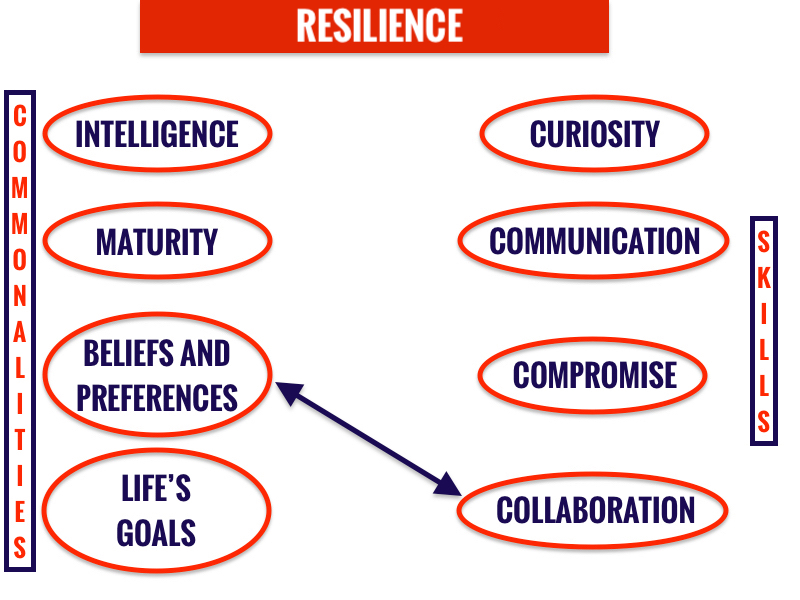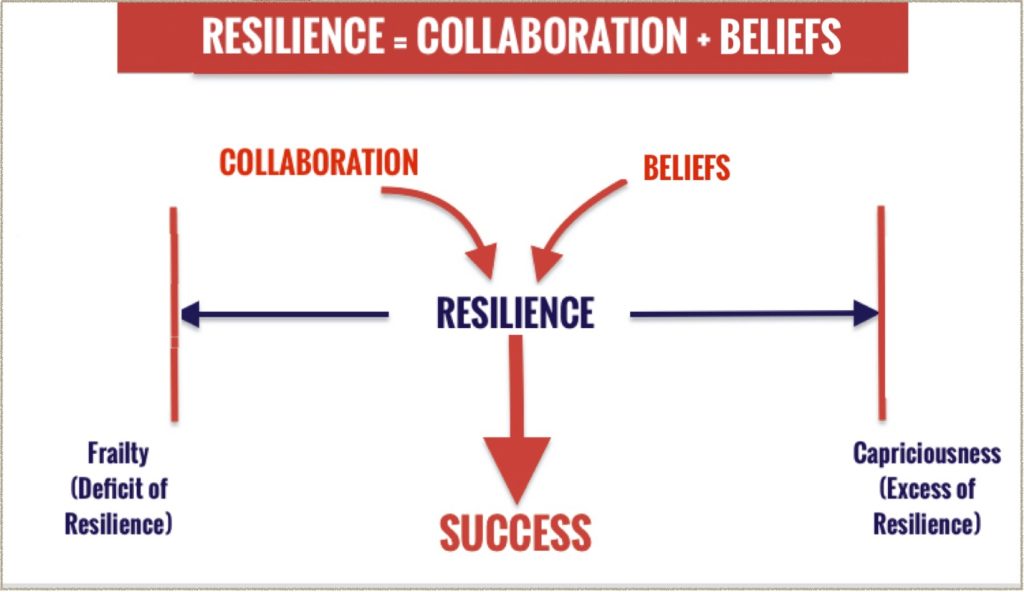Resilience sounds like a general term, but it is highly specific in Romantic Dynamics terminology as combining the Skill of Collaboration with the Commonality of Beliefs and their providing of Faith in Yourself, the ability to "pull yourself up by the bootstraps," and the mantra, "If at first, you don't succeed, then try, try again." It may seem surprising that this character virtue is not one like "being determined" or "being disciplined" (although Resilience is both of these general things.) It recognizes the human condition as imperfect and prone to little failures on the way to a goal.
 Resilience is defined in the dictionary as "the capacity to recover quickly from difficulties; toughness," or "the ability of a substance or object to spring back into shape; elasticity." The latter definition comes from physics and the physical world and the former is the description of a person. This makes sense, since actually achieving a goal in the end takes a lot of actions and physical activity. And so an "elastic" person contains the humanity to dynamically readjust their approach to things, and bend a little with life and the "curve balls" it throws us. As a capacity to "recover from difficulties," the "toughness" of the resilient person may not be that physical, like your physically frail grandmother's, but it certainly is a mental toughness of character, "the bootstrap gene."
Resilience is defined in the dictionary as "the capacity to recover quickly from difficulties; toughness," or "the ability of a substance or object to spring back into shape; elasticity." The latter definition comes from physics and the physical world and the former is the description of a person. This makes sense, since actually achieving a goal in the end takes a lot of actions and physical activity. And so an "elastic" person contains the humanity to dynamically readjust their approach to things, and bend a little with life and the "curve balls" it throws us. As a capacity to "recover from difficulties," the "toughness" of the resilient person may not be that physical, like your physically frail grandmother's, but it certainly is a mental toughness of character, "the bootstrap gene."
It is a character trait and virtue that you want when you see yourself desiring to get to a goal with the spirit of "If at first you don't succeed, try, try again" (which is always the case in human goals, and in life.)
For such a person, conditions do not need to be perfect, ideal or certain, because the world isn't and we aren't. As such, the persistence of trying a thousand times for a goal that is dear enough to you and your partner, which is a good natural fit for a Lover Personality to master due to their "ability to believe," or to have an imagination - which when directed in the positive, optimistic sense, leads to an accumulation of experience at the difficult goal. This may then, in the end, be a large part of the real success principle of Resilience: staying at it long enough to acquire masterful skill at the obstacles.
Resilience is a combination of the Skill of Collaboration with the Commonality of Beliefs, their emergence through the toughest times, at the right time, in the right way. There is quite a "morale" aspect to Resilience.
What makes Resilience unique as a character virtue, is that it doesn't come naturally to many people to "believe in themselves" - when life seems so often that you've "only got one shot" in solving a problem, yet, importantly, to accept a missed shot, and still double down to force a second or third chance - the resilience to never quit.
A second way to describe the "If at first, you don't succeed" maxim is as such: "It's better to shoot for the stars, and land in the mud, than to shoot for the mud, and make it." Better than, "If at first, you don't succeed," this new description, originating from grade-school teacher, Daniel Flick, accepts human mistakes, bad aim, and misdirection, to persist with Resilience.
Typical descriptors in everyday language for this kind of person is "single-minded" or "teflon," thus its tie to the concept of "the goals of war." Such a person may be easily misinterpreted as "arrogant" (of the pessimist's reality) or "full of hubris" in the sense of harkening the narcissistic nature of those "fools who rush in, where angels fear to tread." Such people might even be thought of as obsessive, as their friends beg them to give up on repeatedly trying for their goal.
This is Resilience, and any mature partner will need this trait in their other partner, to take that final leap to a lifelong goal, personal, or joint. It will feel like that tender kind of comment a spouse recieves in response to the quandry, "Should I sign on the line? We get THIS house?" or "Should I send the tuition check? Drop it in the mail slot now? I can't believe I'm going back to school. Should I" To which that resilient spouse says, "YES, Honey, we will MAKE IT HAPPEN." Which means that in terms of personality style, the paternal nature of the Lovers and Warriors will help the Resilience emotionally for the former, in believing in themselves, and in case of Warriors, the repetitive physicality guided by the left-brain.
 From Aristotle's Golden Mean, we learn that every virtue also has two vices. In the case of Resilience, the vice of excess is Capriciousness, or "flakiness or waffling," in one's commitment to execute on an action and the tendency to be undependable. The person feels like an entirely unreliable person, a "flake" and "fickle." We need to stand by our word, with action, especially in a committed relationship, where the core objective is the ability to successfully get to goals together.
From Aristotle's Golden Mean, we learn that every virtue also has two vices. In the case of Resilience, the vice of excess is Capriciousness, or "flakiness or waffling," in one's commitment to execute on an action and the tendency to be undependable. The person feels like an entirely unreliable person, a "flake" and "fickle." We need to stand by our word, with action, especially in a committed relationship, where the core objective is the ability to successfully get to goals together.
The vice of deficit of Resilience is called Frailty, where one is "weak, due to a lack of elasticity, or rigidness", where such a person may seem like "a party pooper" who throws "a wet blanket on everything we dream of and try for." This becomes an incredible spiritual burden on the other partner, in terms of ineffectiveness that turns into chronic "losing."
Resilience has bearing on our performance in phase three - intellectual attraction - step eight, where we seek to amplify the best virtues toward our goals. It is what causes us to see our mate as "never say die" in our lives, and us to feel that we will have failures to keep trying to succeed, but that doesn't mean we will fail to win our goals.

